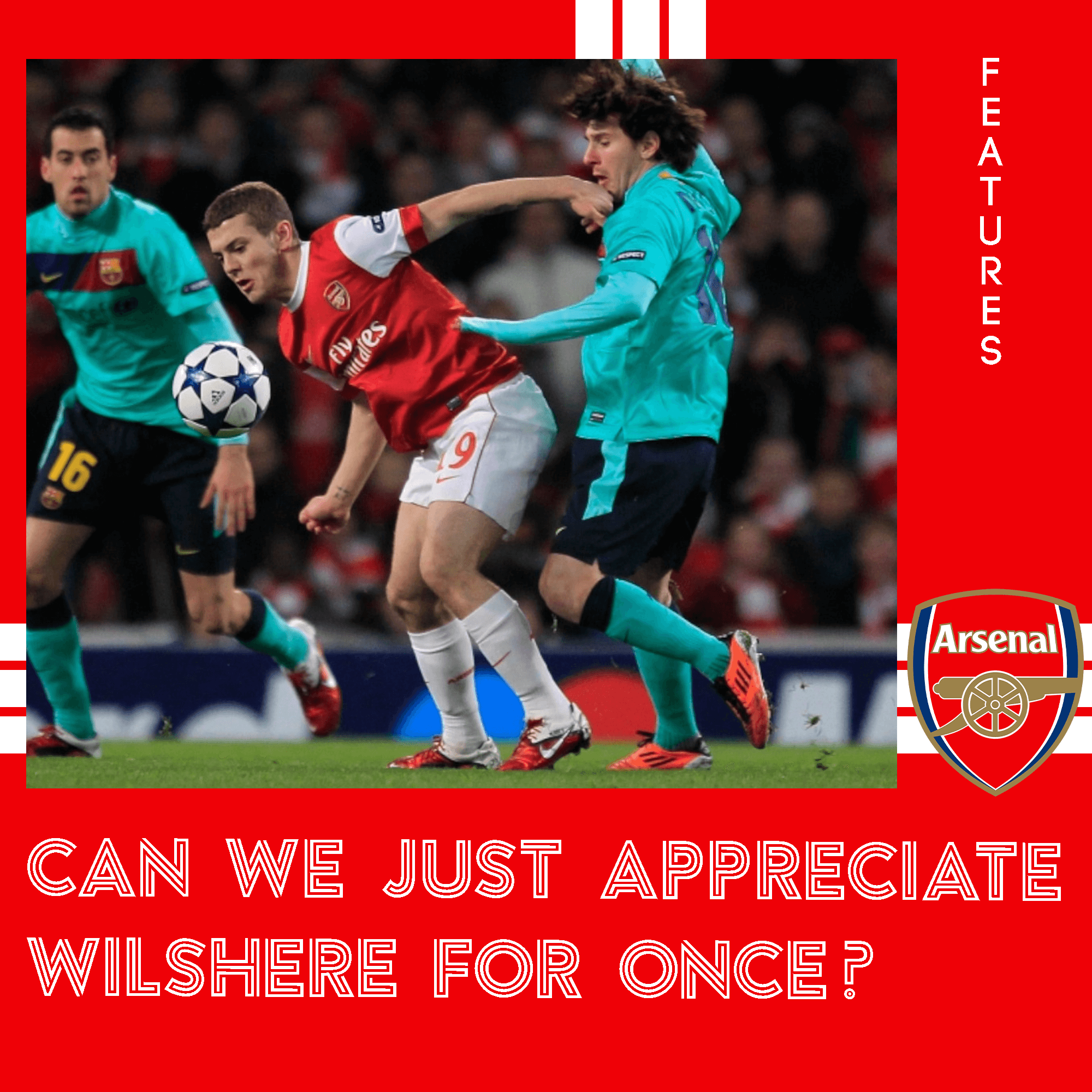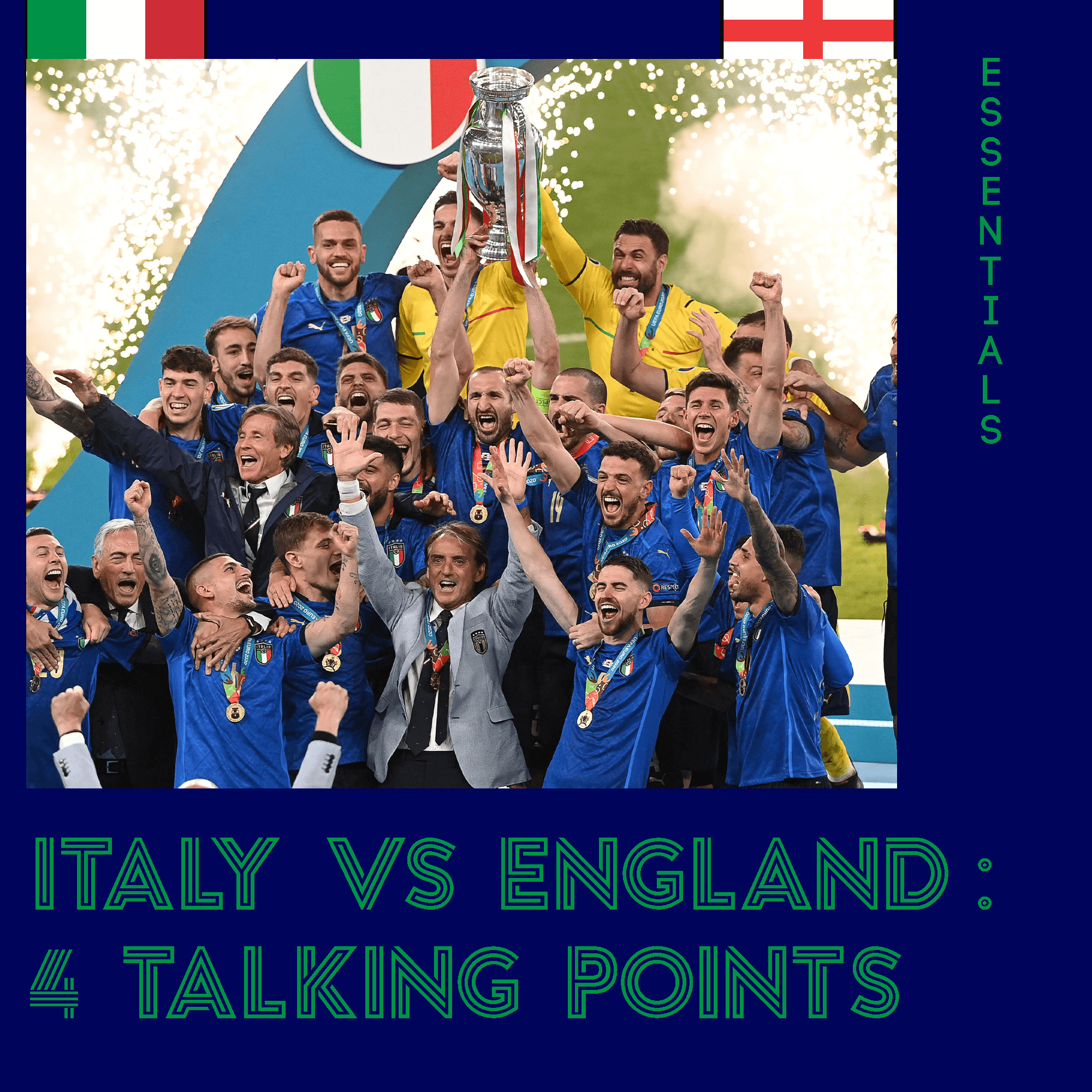CAN WE JUST APPRECIATE WILSHERE FOR ONCE?
ARNAV KHANNA | 23rd July 2021

“Former Arsenal midfielder Jack Wilshere released by Bournemouth” is the headline your eyes would have glanced upon if Arsenal’s biggest boy wonder’s name ever popped up on your screens. Or if – for some reason, you went out of your way to search what path the 29-year old Englishman is treading on nowadays.
Scroll a bit further and you’d find his most recent goal for the Cherries came after a dry spell of 518 days, a trademark edge of the box curler that nestled in the side netting. This was met with a lot of love, felicitation, reminiscing – so much of it in fact that you wonder where is it was coming from?Is it overcompensation for all the times that it went missing when he needed it the most?
There is a certain pen by which Wilshere’s story has always been written, the words laced with disappointment and an undertone of “what could have been”. Today I pick up a different pen, one with more empathy and forgiveness. A lens which he needed then, but at the very least, deserves now.
Now with Wilsh, everyone remembers the highs. From being introduced by Arsene Wenger to the Emirates faithful at the age of 16 years and 256 days, the youngest ever league debutant for the Gunners to that game against Barcelona in 2011 where he ran the midfield against a certain Busquets-Xavi-Iniesta which would later go on to win *checks notes* just any old treble, am I right?
Even years later after the young buck’s virtuosic display, none other than Mr. Xavi Hernandez couldn’t erase that performance from his memory.
“He played a fantastic game against us [in 2011]. Let’s not forget he was just 20 or 21 years old.”
Jack Wilshere had the world at his feet and eating from his palm as a teenager.The mazy runs, a drop of the shoulder that would put a break dancer to shame while paying homage to Muhammad Ali as he would float like a butterfly and sting like a bee, the Hale End prince had everything.
But if you think he was more dainty than dogged, your assumption is off target.
The way he barged into Robin van Persie when he first returned to the Emirates wearing United’s red incited a huge roar from the crowd – and a deep scowl from the physios.
A true people’s champion, Wilsh has always been the same kid you see kicking a ball on a wall for hours, if he’s later found himself, clashing boots against the world’s best.
But these boots had to be taken off often with Wilshere. It started with a stress fracture, then a knee surgery and then the calf bone. As his physical pain sharpened, so did the media’s sword.

20 years old and flying before an injury stopped him in his flight
The babyfaced superstar went from “generational talent” to a “what could have been” with the snap of a finger. Sooner rather than later, it became some sort of a sadistic game to see how hard Wilshere’s fall from grace could be.
The depth of his fall directly proportional to the number of clicks on the article.
Now Jacky was not a saint by any means, he was probably not the model athlete either but that does not justify his pain being rinsed for click-bait titles and the public’s very own pinata.
The allegation that he takes “too long to recover” levied time and time again as some sort of a jab against his effort and commitment to the sport. But is it really that simple?
Injuries linger not just on the body but on the mind. Sliding for the ball in midfield after an injury return gives you flashbacks of the countless hours sitting at home, watching your teammates live out your dreams while rehab becomes 24 x7.
This isn’t something exclusive to Wilshere but an unresearched narrative used to paint a player as “not wanting it enough” or “not doing enough in training”.
And each time the player in question is poked with a needle of his unrealized potential. Beats me.
And the pitch wasn’t the only place where Wilshere was undergoing turmoil either. As the media ruthlessly tore him apart for his injuries, taking a suspect amount of time to recover, making assumptions and assassinating his character, the former Gunner was back home, nursing an ailing son who was prone to getting seizures.
In a 2017 interview, Wenger himself touched on what clearly is a matter much bigger than football.
“And this is why this injury took so long. People don’t realise. They say, ‘He’s always injured, he’s injury prone, he’s never going to be fit,’ but they don’t realise what goes on behind closed doors.”
Wilshere’s quotes on the testing times aren’t supposed to induce guilt but open one’s eyes to the fact that not everything is televised and jumping to conclusions despite not knowing the behind-the-scenes is bang out of order.
“My main focus was my son. I sort of switched off from the outside world a little bit and it makes you change the way you think about things and life. I’m a footballer and that’s great, but family comes first always.”
The fact is, people look at a player’s life through a peephole and assume that’s the window to their daily living. When your knowledge is limited, your empathy shouldn’t be. Therapists are told to have an “unconditional positive regard” for their patients. Maybe us as fans and writers need to be given the same advice.
Empathy is free and someone’s peace is priceless.
Sure, seeing incredible talents not become what they could have isn’t a sight to behold. But if a fan’s disappointment equates to seeing the downfall of said talent, the plater in question’s disappointment equates to seeing the downfall of that one thing that defined him, from knee high to the big leagues.
And after all, the climb from academy to professional football to playing under the Champions League floodlights is one that is reserved for the top 1% of the sport. And to have been at the very top, a young Wilshere needed gentle hands to catch him when he fell – like every human being does.
But the lack of compassion and sheer black and white perceptions made the twinkle-toed midfielder a hero to a villain in no time.
There is a question to be asked here, why does every story need perfection for appreciation? If we start looking the stars that never aligned, then we can even find flaws in the greatness mythical of Leo Messi and Cristiano Ronaldo.
And considering the two kings have set the benchmark for more than a decade, why don’t we smear the rest with the brush of “settling” and being “content” instead of chasing them down and becoming the best?
Nothing should lack as much nuance, that’s why. Shutting oneself away from the reality that footballers are human beings is just bait to being delusional about their limitations.
There’s beauty in Jack’s flawed story and for once, we could simply hark back to the good times instead of scoffing at imperfection.
There needs to be gratitude for what Wilshere was able to give us before he ever fractured his leg on February 1, 2012. And there needs to be appreciation of all that he gave us after.

A 90,000-seated Wembley witnessed Wilshere bossing Brazil in 2013
Almost as overnight as his stardom. There are dues the world owes to Jack Wilshere.
Rather than sighing at his journey, we need to applaud his resilience. There are a select few who would miss almost 1500 days through injury and still kick on. Injury after injury, physio after physio, stretcher after stretcher, recovery after recovery, rehab after rehab, the least Wilshere deserves is his flowers.
And he deserves his memory to be un-tainted by the “has-been” tag. His highs dwarfed skyscrapers but can we not have pride in the lad when he put his lows under the carpet and kept at it?Can it not give us perspective?
Smaller grounds, rougher pitches, harder tackles but no matter where he played, whenever he dropped that shoulder and curled one in, he was – and always will be – the super Jacky Wilshere.
Read More
HOW CHILWELL FINALLY BROKE CHELSEA’S LEFT-BACK CURSE
AMOGH PANSE \
FEATURES
WHY YOU NEED TO JUMP ON THE PEDRI HYPETRAIN
SRINIVAS SADHANAND \
FEATURES
EURO 2020 FINAL REVIEW- ITALY VS ENGLAND: 4 TALKING POINTS
SRINIVAS SADHANAND AND AMOGH PANSE \
ESSENTIALS



